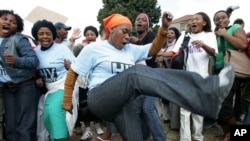The Treatment Action Campaign has long been a beacon of hope for many South Africans suffering with HIV and AIDS. But now it is threatening to close its doors within a month because of a severe budget shortfall.
When the Treatment Action Campaign was founded in 1998, HIV was tearing at the very fabric of South African society, breaking apart families and communities through death, fear and stigma.
In the ensuing years, the TAC fought tooth and nail for the rights of AIDS patients, and scored many landmark victories.
The group was instrumental in forcing the government to back down from its initial AIDS denial, which some healthcare critics say led to more than 300,000 preventable AIDS deaths. The group also helped drive down the price of antiretroviral drugs, involved communities in the struggle against the virus, and fundamentally changed the public perception of HIV.
Today, the TAC is one of South Africa’s most respected groups, but it faces imminent shutdown amid a budget shortfall of about $900,000.
Mark Heywood is one of the group’s founders.
“We can’t let up or relax. And without strong civil society and accountability, that’s the danger," said Heywood.
TAC supporters say the fight against HIV and AIDS has not gotten any easier. Today, an estimated 6 million South Africans are infected, and the organization estimates that 500 people die every day.
In a perverse way, the group is a victim of South Africa’s success. Now that it is a middle-income country, major foreign donors have pulled back.
But unless it get the money it needs, the group says it will shut its doors on December 1, World AIDS Day. It is encouraging ordinary citizens to donate online.
Many big names have rushed to their aid. In a pre-recorded message, Archbishop Emeritus Desmond Tutu pinpointed what makes this organization unique.
“HIV/AIDS brought out the best and worst in us. Political paralysis caused delay and confusion. Death blighted the land. But citizen activism, led by the Treatment Action Campaign in particular, restored hope and dignity," said Tutu.
TAC general-secretary Anele Yawa painted a grim picture of what would happen if the coffers are still dry come December 1.
“If we don’t get this money, we don’t have [a] Plan B. We’ve got Plan A. And Plan A is to make sure we get this money. Because If TAC closed down, we need to understand, all of us here, that many people will die," said Yawa.
Sibongile Tshabalala is one of the many AIDS activists who agree with Yawa’s dire assessment. She says the TAC’s work - especially a landmark 2002 Constitutional Court victory - changed her life. Tshabalala was diagnosed HIV-positive in 2000, two years before TAC successfully sued the government to force it to provide all HIV-positive pregnant women with drugs to prevent mother-child transmission.
“We were discouraged to have babies as people who are having HIV, to say because we will infect our kids. Why are we having babies while we are having babies who are infected with HIV? So after that, I decided to give it a try. They are very lovely and exciting. They brought life back to me," said Tshabalala.
Her son is six, her daughter three, and both are HIV-negative. And, she says, they would not be here if TAC was not there for her.




